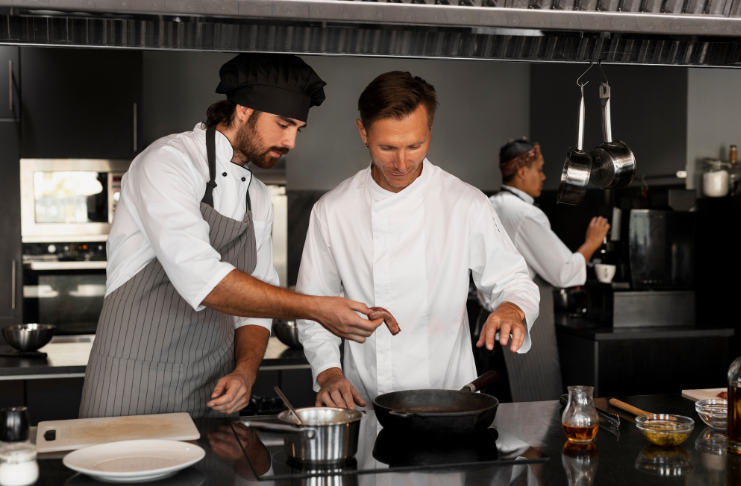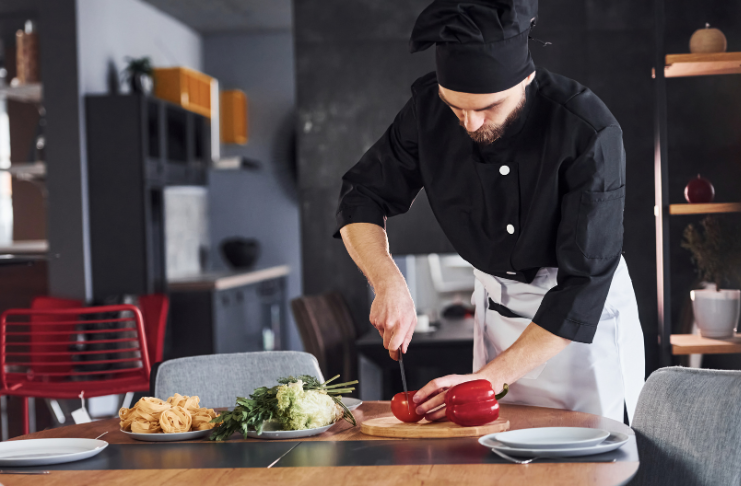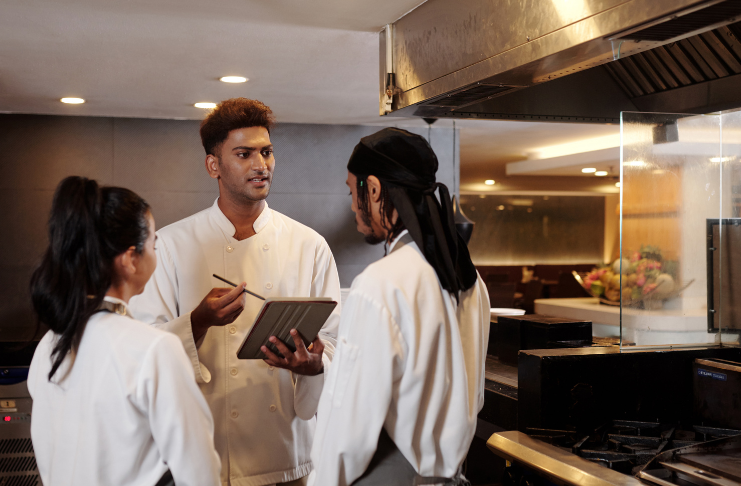
Hiring the right chef is vital to your restaurant’s success. A skilled chef creates delectable dishes that shape your restaurant’s reputation, influence customer satisfaction, and drive profitability. In the competitive restaurant market, understanding how to hire a chef who aligns with your restaurant’s vision and goals is essential. This comprehensive guide will walk you through the process, ensuring you make an informed and effective hiring decision.
Define Your Restaurant’s Needs
Before you begin the process of hiring a chef, the first and most crucial step is to define what exactly your restaurant needs in terms of culinary expertise, experience, and leadership. Your chef influences your menu, kitchen operations, brand identity, and customer experience.
By clearly outlining your requirements, you reduce the chances of hiring the wrong candidate and streamline the hiring process. Below are the key factors to consider:
1. Type of Restaurant
- Fine Dining: A fine dining restaurant requires a chef with experience in sophisticated, high-quality cuisine, capable of creating intricate dishes and delivering an exceptional dining experience. They should have a deep understanding of presentation, flavor profiles, and the ability to innovate.
- Casual Eatery: A casual eatery may need a chef who can create delicious, approachable dishes with a focus on comfort and familiarity. Versatility and efficiency are key, as the menu might change frequently to keep customers engaged.
- Fast-Casual Spot: For a fast-casual restaurant, speed and consistency are crucial. A chef here should be adept at preparing quality meals quickly, maintaining high standards even during busy periods.
2. Cuisine Specialty:
- Cuisine Type: Clearly define the specific type of cuisine your restaurant focuses on. Whether it’s Italian, Asian fusion, vegan, or any other specialty, the chef you hire should have a proven track record and expertise in that particular cuisine. This ensures authenticity and consistency in the dishes served.
3. Experience Level:
- Executive Chef: This role oversees the entire kitchen operation, from menu planning and inventory management to staff training and quality control. They should have significant experience and leadership skills.
- Sous Chef: A sous chef assists the executive chef and manages day-to-day operations in the kitchen. They should be experienced in cooking and kitchen management and able to step into the executive chef’s role when needed.
- Line Cook: Line cooks are responsible for preparing specific dishes or sections of the menu. While they don’t need the extensive experience of an executive or sous chef, they should be skilled in executing recipes with precision and consistency.
4. Cultural Fit and Leadership:
- Leadership Qualities: Look for chefs with strong leadership skills who can effectively inspire and manage a team. They should be able to handle high-pressure situations, make quick decisions, and maintain a positive kitchen atmosphere.
- Personality Traits: It’s crucial to hire a chef whose personality aligns with your restaurant’s culture and values. Consider traits such as teamwork, communication skills, creativity, and a passion for culinary excellence.
Understanding the U.S. Job Market for Chefs
According to the U.S. Bureau of Labor Statistics, the demand for chefs is expected to grow by 15% from 2023 to 2033, faster than the average for all occupations. This growth is driven by an increasing population and a growing interest in dining out.
Approximately 24,600 chef positions are projected to open each year over the next decade, with many openings resulting from the need to replace workers who transfer to different occupations or exit the labor force.
With this projection, the work can be hectic and fast-paced, requiring chefs to manage multiple tasks simultaneously and maintain high quality and presentation standards.
How to Hire a Chef That Will Transform Your Restaurant
To attract top culinary talent, utilizing a comprehensive recruitment strategy that leverages multiple channels is essential. Here’s a deeper look at each approach:
- Job Boards: Post your job openings on hospitality-focused job boards like Indeed, Culinary Agents, and Poached Jobs. These platforms cater specifically to the food service industry, increasing the chances of reaching qualified chefs who are actively seeking new opportunities.
- Culinary Schools: Connect with renowned culinary institutions such as the Culinary Institute of America or Johnson & Wales University. These schools produce highly skilled graduates who are eager to make their mark in the culinary world. Establishing relationships with these institutions can provide a steady stream of talented candidates.
- Networking: Attend industry events, food festivals, and culinary expos to meet potential candidates in person. Joining chef associations and culinary groups also provides opportunities to network with experienced chefs and gain referrals from industry insiders.
- Recruitment Agencies: Partner with recruitment agencies that specialize in hospitality placements. These agencies have extensive networks and expertise in matching qualified chefs with suitable employers. They can streamline the hiring process and present you with top-tier candidates.
- Employee Referrals: Encourage your current staff to refer qualified chefs they know. Offering incentives for successful hires can motivate your employees to tap into their professional networks, bringing in candidates who are likely to fit well with your restaurant’s culture.
How to Write a Chef Job Description
An engaging and detailed job description is vital to attract suitable candidates. Include:

1. Job Title and Overview
- Job Title: Start with a clear and precise job title, such as “Executive Chef,” “Sous Chef,” or “Line Cook.”
- Overview: Provide a brief yet informative overview of your restaurant. Describe its concept, cuisine, atmosphere, and location. This sets the stage for candidates to understand the environment they will be working in.
2. Responsibilities
- Menu Development: Creating and updating menus, introducing new dishes, and ensuring variety and quality.
- Kitchen Management: Overseeing kitchen operations, ensuring efficiency, and maintaining a clean and safe working environment.
- Staff Training: Hiring, training, and mentoring kitchen staff to ensure high standards of food preparation and presentation.
- Inventory and Cost Control: Managing inventory, sourcing ingredients, and controlling food costs to maximize profitability.
- Customer Interaction: Occasionally interacting with customers to receive feedback and make necessary improvements.
3. Qualifications
- Experience: Specify the level of experience required. This could range from a certain number of years in a similar role to specific experiences in fine dining or high-volume kitchens.
- Education: Mention any educational requirements, such as a degree or certification from a culinary school.
- Culinary Skills: Highlight essential skills, such as knife skills, knowledge of cooking techniques, and expertise in specific cuisines.
4. Personality Traits
- Creativity: Emphasize the importance of creativity in developing unique and appealing dishes.
- Leadership: Look for candidates with strong leadership qualities who can manage and inspire their team.
- Teamwork: Highlight the need for excellent teamwork and communication skills to ensure smooth kitchen operations.
- Adaptability: Mention the ability to adapt to changing situations and handle high-pressure environments.
5. Compensation and Benefits
- Salary Range: Provide a competitive salary range to attract qualified candidates.
- Health Benefits: Include information about health insurance, dental, and vision coverage.
- Additional Perks: Mention any additional benefits such as paid time off, retirement plans, employee discounts, or opportunities for career advancement.
Salary, Benefits, and Retention Strategies
To attract and retain top talent, offer competitive compensation and growth opportunities. Here’s a detailed look at adequate salary, benefits, and retention strategies:
- Industry Standards: Ensure that your pay scales align with your region’s industry standards. Conduct market research to determine the average salaries for various chef positions, from line cooks to executive chefs.
- Health Insurance: Provide comprehensive health insurance plans that cover medical, dental, and vision care. This is a critical benefit that can significantly impact employee satisfaction and retention.
- Retirement Plans: This helps employees plan for their future and shows your commitment to their long-term well-being.
- Performance Bonuses: Introduce performance-based bonuses to incentivize excellence. This could be tied to achieving specific goals like cost control, customer satisfaction, or innovative menu development.
- Reasonable Hours: Promote a healthy work environment by setting reasonable working hours. Avoid excessive overtime and ensure that your chefs have adequate time for rest and personal activities.
- Time-Off Policies: Provide generous paid time off (PTO) policies, including vacation days, sick leave, and personal days. Encourage your staff to take their time off to recharge and avoid burnout.
INDUSTRY INSIGHTS
According to a survey conducted by the American Culinary Federation, 89% of restaurateurs believe that hiring the right chef directly impacts their bottom line. This highlights the importance of finding the right culinary talent for the success of a restaurant.
Onboarding and Training Your New Chef
A structured onboarding process ensures a smooth transition, helps new hires feel confident in their role, and aligns them with your restaurant’s goals and culture. Here’s a detailed approach:
1. Orientation
- Introduction to Restaurant Culture: Begin by introducing the new chef to your restaurant’s unique culture, values, and vision. Explain what sets your restaurant apart and how the chef’s role aligns with your overall mission.
- Policies and Procedures: Review important policies, including health and safety regulations, code of conduct, and kitchen protocols. Ensure the chef understands the expectations and standards of your establishment.
- Meet the Team: Facilitate introductions with key team members, including kitchen staff, front-of-house employees, and management. This helps the new chef build rapport and understand the dynamics of the team.
2. Training
- Kitchen Layout and Equipment: Familiarize the chef with the kitchen layout, equipment, and tools they’ll be using daily.
- Inventory Management: Teach the chef how to manage inventory effectively, including ordering supplies, tracking usage, and minimizing waste.
- Food Safety Protocols: Ensure the chef understands and follows food safety and hygiene protocols to maintain a clean and safe kitchen environment.
- Menu Familiarization: Review the current menu, including signature dishes, preparation techniques, and presentation standards.
3. Expectations & Performance Goals
- Clear Performance Goals: Set clear and measurable performance goals for the chef. These goals should focus on:
- Menu Consistency: Ensuring dishes are prepared consistently to maintain quality and meet customer expectations.
- Food Quality: Upholding high standards of food quality, including taste, presentation, and freshness.
- Kitchen Efficiency: Improving kitchen efficiency by streamlining processes, reducing preparation times, and managing staff effectively.
- Regular Feedback: Schedule regular check-ins to provide feedback on performance, celebrate achievements, and address any areas for improvement.
4. Encouraging Open Communication
- Feedback and Suggestions: Create an environment where the chef feels comfortable sharing feedback and suggestions for improving operations. This encourages collaboration and innovation within the team.
- Open-Door Policy: Establish an open-door policy where the chef can discuss concerns or ideas with management. This fosters a supportive and transparent work environment.
Retaining Your Chef and Building a Strong Team

Once you’ve successfully hired a chef, retention becomes the next challenge. The hospitality industry often faces high turnover, so building a positive work culture is essential. Here are a few strategies to retain your chef:
- Competitive Compensation & Incentives: Regular salary evaluations, performance-based bonuses, and profit-sharing options help keep top talent motivated.
- Work-Life Balance: Ensure fair scheduling, offer paid time off, and prevent burnout to maintain job satisfaction.
- Team Culture & Respect: Foster a healthy kitchen environment where teamwork, respect, and professionalism are priorities.
- Growth & Recognition: Offer professional development opportunities like leadership training, culinary competitions, and mentorship programs.
- Constructive Feedback & Engagement: Regularly check in with your chef to discuss career aspirations, challenges, and any necessary adjustments.
Conclusion
Hiring the right chef is one of the most crucial decisions for your restaurant’s success. A great chef does more than cook— they shape your brand, define your menu, and influence customer experiences, contributing to your restaurant’s long-term success and reputation.
By following this comprehensive guide on how to hire a chef, you can streamline the recruitment process, attract top talent, and build a culinary team that enhances your restaurant’s reputation.
Frequently Asked Questions
Use job boards (Culinary Agents, Poached Jobs), culinary schools, networking, recruitment agencies, and employee referrals.
Post job ads, attend culinary events, use referrals, and partner with hospitality recruiters.
The cost of a personal chef in North Carolina (NC) varies based on the chef’s experience, cooking skills, number of meals, and location. On average:
- Hourly Rate: $30 – $100 per hour.
- Weekly Meal Prep Service: $250 – $750 per week for multiple meals.
- Private Event Chef: $100 – $200 per person for a private dinner experience.
Yes, if you want customized meals, convenience, and high-quality home-cooked food.
Post jobs online, ask for referrals, check culinary schools, and conduct cooking trials.
Restaurant chef: $50K – $100K/year. Personal chef: $80K – $200K/year. Event chef: $100 – $250 per person.
Define needs, post job listings, network, interview, conduct trial shifts, and check references.
The cost of a personal chef in Los Angeles (LA) is higher than the national average due to demand and cost of living. On average:
- Hourly Rate: $50 – $200 per hour.
- Weekly Meal Prep Service: $500 – $1,500 per week for custom meal plans.
- Private Dinner Events: $200 – $500 per person, depending on the menu and chef’s reputation.
If you need someone to cook for you at home, you have several options:
- Hire a Personal Chef
- Use a Private Chef Service
- Look for Meal Prep Chefs
- Ask Local Restaurants or Catering Services








